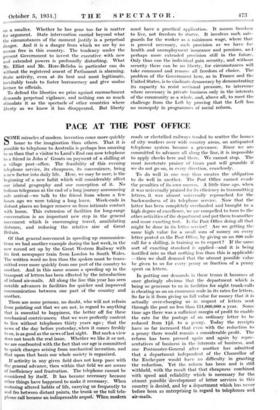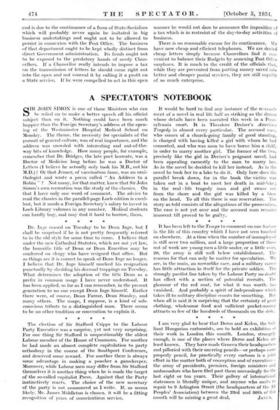PACE AT THE POST OFFICE
SOME miracles of modern invention come more quickly home to the imagination than others. That it is possible to telephone to Australia is perhaps less amazing to us than that a visitor to Land's End can now telephone to a friend in John o' Groats on payment of a shilling at a village post - office. The feasibility of this evening telephone service, its cheapness, its convenience, bring a new factor into daily life. Here, we may be sure, is the beginning of a new habit which will considerably affect our island geography and our conception of it. No tedious telegrams at the end of a long journey announcing safe arrival—we talk to the friend from whom a few hours ago we were taking a long leave. Week-ends in distant places no longer remove us from intimate contact with home. This extension of facilities for long-range conversation is an important new step in the general movement which is encouraging travel, annihilating distance, and reducing the relative size of Great Britain. • Of that general movement in speeding up communica- tions we had another example during the last week, in the new record set up by the Great Western Railway with its first newspaper train from London to South Wales. The written word no less than the spoken must be trans- mitted ever more quickly from one part of the country to another. And in this same season a speeding up in the transport• of letters has been effected by the introduction of inland air-mails. All along the line this year has seen notable advances in facilities for quicker and improved communication between one part of the country and another.
There are some persons, no doubt, who will not refrain from pointing out that we are not, in regard to anything that is essential to happiness, the better off for these mechanical contrivances; that we were perfectly content to live without telephones thirty years ago ; that the news of the day before yesterday, when it comes freshly to us, is as good as the news of last night. But such a view does not touch the real issue. Whether we like it or not, we are confronted with the fact that our age is committed to quick changes arising from mechanical invention, and that upon that basis our whole society is organized.
If activity in any given field does not keep pace with the general advance, then within that field we are aware of inefficiency and frustration. The telephone cannot be considered by itself. It has become necessary because other things have happened to make it necessary. When motoring altered habits of life, carrying us frequently to and fro between distant points, the trunk or the toll tele- phone call became an indispensable sequel: When modern roads or electrified railways tended to scatter the homes of city workers over wide country areas, an antiquated telephone system became a grievance. Since we are committed to advance all along the line, it is impossible to apply checks here and there. We cannot stop. The most inveterate praiser of times past will grumble if we do not go on, in every direction, ceaselessly. .
To do well in one way thus creates the obligation to do well in another. The Post Office cannot evade the penalties of its own success. A little time ago, when it was universally praised for its efficiency in transmitting letters, it was almost universally reproached for the backwardness of its telephone service. Now that the latter has been completely overhauled and brought to a high degree of excellence, we are compelled to turn to the other activities of the department and put them to another and more exacting test. Is the Post Office doing all that might be done in its letter service? Are we getting the same high value for a small sum of money on every letter posted as the Post Office, by giving us an 800 mile call for a shilling, is training us to expect ? If the same sort of exacting standard is applied—and it is being instilled into us that nothing less than this is applicable —then we shall demand that the utmost possible value be given to us for every penny or fraction of a penny spent on letters.
In putting our demands in these terms it becomes at once glaringly obvious that the department which is being so generous to us in facilities for night trunk-calls is cheating us on an enormous scale in its rates for letters. So far is it from giving us full value for money that it is actually over-charging us in respect of letters sent through the post no less than £11,000,000 a year. Some time ago there was a sufficient margin of profit to enable the rate for the postage of an ordinary letter to be reduced from lid. to a penny. Today the receipts have so far increased that even with the reduetiOn to a penny there would remain a considerable profit. The reform his been pressed again and again by repre- sentatives Of business in the interests of business, and one Potmaster-General after another has admitted that a department independent of the Chancellor of the Exchequer would have no difficulty in granting the reduction.' Yet the reform has been and is still withheld, with' the result that that cheapness combined with speed and , reliability which is necessary for the utmost poSsible 'development of letter services in thii country is denied, and by a department which has never before been so enterprising in regard to telephones and air-mails. and is due to the continuance of a form of State-Socialism which will probably never again be imitated in big business undertakings and ought not to be allowed to persist in connexion with the Post Office. The business of that department ought to be kept wholly distinct from direct Government administration. Its funds ought not to be exposed to the predatory hands of needy Chan- cellors. If a Chancellor really intends to impose a tax on the transmission of letters he should come right out into the open and not conceal it by calling it a profit on a State service. If he were compelled to act in this open manner he would not dare to announce the imposition of a. tax which is in restraint of the day-to-day activities of business.
There is no reasonable excuse for its continuance. We have now cheap and efficient telephones. We are denied cheap letters simply because Chancellors find it con- venient to balance their Budgets by annexing Post Office surpluses. It is much to the credit of the officials that, while they are prevented from putting money saved into better and cheaper postal services, they are still capable of so much enterprise.











































 Previous page
Previous page